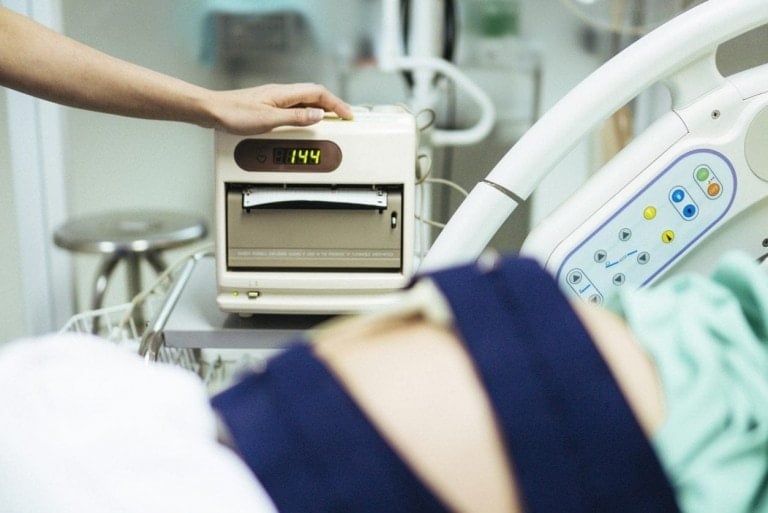While the idea of pregnancy can be quite exciting, the symptoms of pregnancy can be uncomfortable. From experiencing morning sickness to pelvic pain, many women find themselves wishing they could fast forward through these issues to meet their baby. One complaint during pregnancy can be constipation.
Coming from someone who was very regular before pregnancy, pregnancy constipation can be frustrating and uncomfortable. It left me and many other women wondering why this happens and how to relieve it. Here, we will look at common pregnancy constipation issues and treatments.
What Is Pregnancy Constipation?
Constipation is a term that can mean something different to everyone, depending on how often you have bowel movements. Constipation during pregnancy generally refers to infrequent bowel movements and difficult or painful bowel emptying.1 Besides infrequent and difficult-to-pass bowel movements, constipation can cause bloating, abdominal pain, and sluggishness.2
What Causes Pregnancy Constipation?
If you were used to a regular stooling schedule pre-pregnancy, you might wonder what causes constipation during pregnancy. Many factors contribute to slowed motility through the intestines while pregnant.
Hormones
The hormone progesterone increases early in pregnancy and remains elevated until delivery. Progesterone increases the time it takes for food to move through the bowels. The hormone motilin decreases in pregnancy, further slowing down intestinal movement.1,3
Stool becomes harder when food moves slower because more water is absorbed as food sits in your bowels for longer. The harder the stool becomes, the less frequently and easily it will be evacuated.1
Decreased Activity
Exercise and body movement help to move food through the digestive system. The fatigue and busyness of pregnancy can make you slow down and exercise less, increasing the likelihood of constipation.3
Vitamin Supplementation
Many pregnant women take a prenatal vitamin and are advised to supplement with iron. Does your iron supplement cause constipation? The answer is it’s possible. Iron has been associated with slowed intestinal transit time and increased bloating and constipation.4 Calcium supplementation may also contribute to pregnancy constipation.1
Anatomy
As pregnancy progresses and your uterus grows, it may increase pressure on your bowels and slow movement. The changes in the structure and layout of your abdomen and intestines during pregnancy may contribute to pregnancy constipation.1
When Does Constipation Start in Pregnancy?
Constipation can start at any point in pregnancy. Some women experience it early in the first trimester, while others do not feel it until later. Some don’t experience it at all.3
The hormone progesterone rises after ovulation, continues to increase, and remains elevated if you become pregnant. Since progesterone may contribute to constipation, some women experience constipation starting very early in pregnancy.3,5
However, the onset of constipation for others may be later in pregnancy, as your baby grows significantly and adds pressure inside your abdomen. Some women do not experience pregnancy constipation at all, and some may feel it one week and not the next.3
Is Constipation a Sign of Pregnancy?
While constipation can begin early in pregnancy and might be linked in some cases, constipation can happen for different reasons.
Many causes of constipation are not pregnancy-related, so constipation is not necessarily a sign that you are pregnant. There are more specific early pregnancy symptoms that might signify you are pregnant. It can be tempting to “symptom-spot” or speculate whether you are pregnant based on physical symptoms you are experiencing, but the best way to know for sure if you are pregnant is to wait until your missed period and then take a pregnancy test.3
How Common Is Pregnancy Constipation?
Constipation during pregnancy is common, with some studies reporting over a third of women experiencing it.1 But just because constipation is common during pregnancy does not mean it should be ignored.
How Can I Prevent Pregnancy Constipation?
To prevent pregnancy constipation and get your bowels moving, there are nutrition, hydration, and exercise goals you should aim to reach:
Fiber
While it can be difficult to stomach certain foods during pregnancy, shoot for 25-30 grams of fiber daily from fruits, vegetables, legumes, and whole grains. Fiber helps to soften stool and move it through the intestines. It can help produce a bowel movement and prevent constipation.3
Fluids
Your need for water increases during pregnancy, from increased blood volume to amniotic fluid production. You may become constipated if you do not increase your water consumption to meet these needs. Aim for 8-12 cups of water per day to prevent constipation during pregnancy.3
Exercise
While pregnancy can make movement more difficult and uncomfortable, waste is more likely to accumulate in your gut when you are sedentary. Getting 20 to 30 minutes of moderate exercise during pregnancy three times per week can help keep things moving. If you have any concerns or doubts, speak with your provider about safe exercises and activities during pregnancy.3
Probiotics
Good gut bacteria help move food through the digestive system quickly and efficiently. Adding a daily probiotic may alter the intestinal flora and increase gut motility.1
What Is Safe To Take for Constipation While Pregnant?
If you are feeling desperate to have a bowel movement, you might be wondering how to relieve constipation during pregnancy immediately. Many stool softeners and laxatives are available over the counter. While many medications are safe for pregnancy, you have to be careful, especially before full term, because many that stimulate bowel contractions can also stimulate uterine contractions. You do not want to end up in early labor because of constipation.6
The best stool softener during pregnancy can vary from person to person. Most laxatives are not absorbed systemically, meaning they stay in the gut and do not reach the baby.1 However, your provider knows your medical situation and history and can recommend the best pregnancy constipation relief. The various options for stool softeners in pregnancy are outlined below.
There are many stool softeners and laxative options during pregnancy. It may take some trial and error before you find a solution that works for your pregnancy constipation. Always consult your provider before starting any new medications.
Bulk-Forming Agents
For some people, bulk-forming agents or fiber supplements such as bran or psyllium are effective at relieving pregnancy constipation. They are safe to take but can increase gas, bloating, and cramping in some women. Fiber supplements can also take up to three days to work.1 Chia seeds can also help relieve constipation due to their high fiber content.7
Stool Softeners
Stool softeners such as docusate sodium or Colace increase your stool’s salt and water content, making it softer and easier to pass.1,7 Other substances that soften stool during pregnancy include magnesium and polyethylene glycol or Miralax. These draw water into the bowels and soften stool, relieving constipation. However, prolonged use of these stool softeners may lead to electrolyte imbalance in you or your baby.1
Laxatives
Stimulant laxatives act directly on the nerves and muscles of the intestines, causing food to move more quickly through. Examples of these include bisacodyl or Dulcolax, and senna. These medications are also poorly absorbed and will likely not reach your baby. Therefore, they are likely safe for pregnancy but can cause intense intestinal cramping. In some cases, intestinal cramping can irritate the uterus as well. They can also cause electrolyte imbalance and dependence on the medication.1 They should only be taken at your doctor’s recommendation and only for short periods.
Castor oil is a laxative that is also known for inducing labor in overdue pregnancies.8 Whether you are trying to evacuate your bowels or evict your baby, extreme caution should be used when taking this substance during pregnancy.
Can Constipation Hurt the Baby?
No. While constipation can be uncomfortable and frustrating for you, the increase in abdominal pressure due to constipation will not hurt your growing baby.3
Constipation can cause fecal impaction, which can be a severe complication, but this is rare.1 Although your baby is safe, you still want to get ahead of pregnancy constipation so it does not reach the point of danger. Constipation can also cause anal tears or fissures and can cause or worsen hemorrhoids.3 Softening your stools and passing them more easily and frequently can prevent these side effects of pregnancy constipation.
While constipation during pregnancy is rarely severe, you still want to get ahead of it for both comfort and safety. If fiber, fluids, and movement are not working, talk to your provider about getting occasional relief from a stool softener or laxative. As you progress through pregnancy, they can help you find a balance between diet, exercise, and medication that works for you.
































